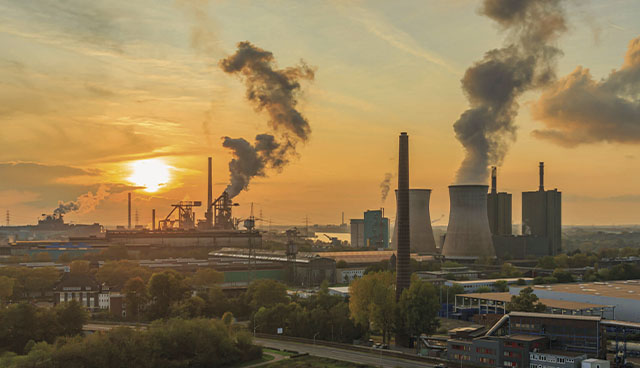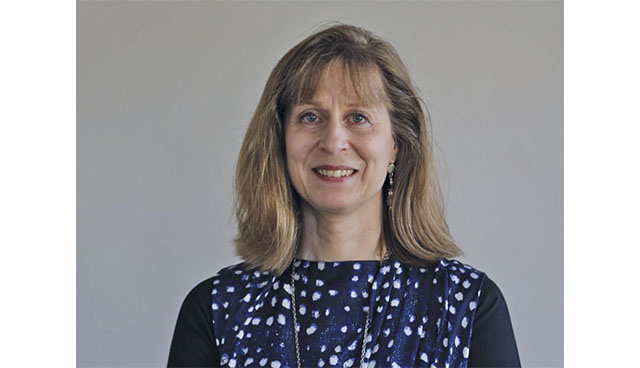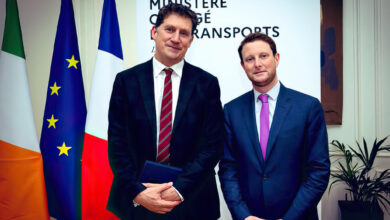Catharina Sikow-Magny: Decarbonising Europe’s economy

Catharina Sikow-Magny, Director of Green Transition and Energy System Integration at the European Commission, discusses the role of renewable energy in decarbonisation, the Fit for 55 legislative package, and how Ireland is leading the charge to decarbonise electricity.
The European Green Deal aims at making the EU climate neutral by 2050. To achieve this, a binding target to reduce greenhouse gas emissions by at least 55 per cent by 2030 was set by the European Commission.
To implement this ambition, the Fit for 55 package was adopted in three parts: in summer 2021, 12 legal proposals aimed at making this target a cost-effective reality were published with laws specific to renewables, energy efficiency, emissions, land use, and transport. In December 2021, then, the Commission published the second part of the package with legislative proposals focusing on how to decarbonise the gases sector and buildings.
Targets
Sikow-Magny says that one of the key objectives to realise the aims of the package is the rigorous deployment of renewable energies across all sectors. She notes that Europe had the 20-20-20 targets for 2020 and met its targets by reducing emissions by 20 per cent, increased the share of renewables and improved energy efficiency.
“At the EU level, we have somewhat exceeded the 20 per cent target on renewables; we are at 21.3 per cent,” Sikow-Magny says, adding: “The situation in member states is very different as the targets were very different; Ireland has met its target with 16.2 per cent, slightly exceeding it. The specific success stories in the EU are in the electricity sector, where 37 per cent today comes from renewable sources and here Ireland has made spectacular progress recently and can clearly show best practice examples to other member states.”

Progress
In 2010, Europe had 110GW of solar and wind capacity cumulatively. Today, the EU has 120GW in solar and over 170GW in wind. In other sectors, progress has been too slow. However, sectors such as heating and cooling, industry, transport, all these sectors rely heavily on fossil fuels still, Sikow-Magny notes. “This is the situation in Ireland and everywhere in Europe almost and further efforts are needed to get these sectors on track for decarbonisation. Here, electrification, offshore wind and renewables will play a very important role,” she says.
“It is extremely important to fully and correctly transpose the existing Renewables Directive. The transposition deadline was summer 2021 and, by then, all member states failed to transpose the directive. Ireland has only notified partial transposition, so we will of course call for full transposition of the directive so that progress can be made. We will call for further meetings to ensure coherent compliance. In the meantime, we also tabled the new proposal for reviewing the directive. It is a focused review concerned with how to accelerate uptake of renewables.”
In the context of the gas and oil price hikes currently happening in Europe, Sikow-Magny further emphasises the need for action: “The more renewables and the more energy efficiency we can bring into the economy, the lower the pressure on imports and prices will be. This is urgent.
“The more renewables and the more energy efficiency we can bring into the economy, the lower the pressure on imports and prices will be. This is urgent.” – Catharina Sikow-Magny, Director of Green Transition and Energy System Integration, European Commission
Fit for 55
“The Fit for 55 package introduced a few changes to the directive. First was the ambition of the overall target, which was changed from 32 per cent to 40 per cent and given that the cost of many renewable technologies has come down significantly, 40 per cent has shown to be cost effective. Secondly, in order to bring the change more rapidly to the underperforming sectors, we have also proposed indicative binding targets for buildings, heating and cooling, transport and industry.”
The aim for the European Commission is for 65 per cent of all electricity to come from renewables by 2030. Sikow-Magny states that the Commission “appreciate[s] Ireland’s position here as being one of the leading countries and the ambition Ireland has set for itself is the model for other countries to follow” before again underlining the need to bring renewables to the heating and cooling sector.
“What we also need to put in place is storage and flexibility and end-user flexibility in particular by decarbonising the industrial processes where hydrogen can play a big role,” she says, emphasising: “Hydrogen is the third point, where incentives for boosting the hydrogen economy are being put in place and we also agree that hydrogen is likely to start in the industrial sector. By 2030, we could see cross-border hydrogen emerge across the EU.
“The fourth point is that we have proposed to strengthen some of the sustainability criteria that relate to biomass, which of course is a very significant source of renewables, representing 60 per cent of renewables today. While it is not increasing dramatically, it will continue to play an important role.”
Window of opportunity
Sikow-Magny confirms that the Commission will look to simplify and shorten permitting procedures by promoting the uptake of corporate purchase power agreements and by fostering cooperation in areas such as offshore wind. The Commission, she says, is aware of Ireland’s unique challenges surrounding interconnection and thus is happy to see the construction of the Celtic Interconnector progressing. “We strongly welcome Ireland’s efforts and commitments in particular to the phasing out of most polluting sources of energy such as peat,” she adds. “The aim for high investment in energy technologies of the future such as offshore wind, storage, hydrogen, and advanced system services, is also welcome.”
The Director concludes by sounding a note of warning about the short window of opportunity: “2030 is almost tomorrow. While it is eight years from now, in terms of infrastructure and production that is very close. This is ambitious and realistic, so we need to speed up and work together to develop best practices. Ireland can play a very important role vis à vis the experience it has and good practices it has developed, but also Ireland can learn from other member states when it comes to areas where it is lagging slightly behind.”





